Introduction
This page describes a straw-man proposal to reorganize the LSST DM software stack, both at the package (i.e. git/eups/scons boundary) and namespace (C++ namespace and Python package) level. At the package level, it is almost entirely a consolidation of packages. Many existing packages will have components moved into more than one package in the new scheme, but most will have the vast majority of their content move to just one new package, and there will be many fewer packages.
The motivation for moving towards consolidation are:
- Having fewer packages is less intimidating to users and makes the installation process at least feel simpler (I hope that it may also be simpler, but I don't think we know that yet).
- Having a large number of packages complicates the build, packaging, testing, and documentation systems, requiring more things to be automated to keep developer workflows efficient.
- Testing is easier with a smaller number of packages, as high-level components that may have otherwise been in a separate package can be used when testing low-level components.
- Earlier concerns about revision control collisions due to multiple developers working on the same package have essentially been eliminated by the switch from svn to git.
- A smaller number of packages makes a namespace reorganization easier, by making it more likely that related code can be put within a single namespace without needing that namespace to cross package boundaries.
There are also some arguments against:
- Partial stack rebuilds that don't reuse local source directories (e.g. those invoked by "eups distrib install") will be slower on average, as we will have to rebuild more code. Note that binary packages installs should be unaffected overall, and developer builds that reuse local source directories may be slightly faster, as scons should be able to do a better job of determining what needs to be rebuilt when it doesn't have to cross package boundaries.
- Both internal and external packages will often have dependencies that are larger than they strictly need to be, which will make building just that package slower and more difficult than before, especially if the extra dependencies in our code bring extra third-party package dependencies. The main goal of a good reorganization proposal is that it mitigates this effect.
And there are arguments that are strongly in favor of some kind of namespace reorganization, but are agnostic as to whether the corresponding package reorganiation should be a consolidation, a further partition, or neither:
- Our current set of namespaces are largely historical and based on WBS elements that are meaningless to users and most developers.
- Some of our most important logical code units are each scattered across several different namespaces and packages, making them harder to follow than necessary.
- Many of our current namespaces are essentially smorgasbords of unrelated or tenuously-related code, and hence provide little or no organizational utility.
Package Reorganization Proposal
New Packages
In the above diagram, lines indicate dependencies between the proposed new packages (arrow points from the dependent package to the one it depends on). Regular solid lines indicate required dependencies, while dotted lines indicate optional dependencies that are necessary to enable certain features. The gray line between "primitives" and "harness" indicates a possible temporary dependency that may be necessary during the initial transition but should ultimately become unnecessary after some already-planned improvements to the codebase are made.
The third-party package dependencies are discussed in the next section.
All of the names of the above packages are purely provisional; I hate naming things, and I think the content of these packages is a much more important discussion than their names. But I'd rather not change any names until that discussion is done, because it'd be a pain to change all the diagrams.
Here's a general description of the philosophy behind this organization:
- qserv is mostly distinct from the rest of the DM stack, and shares only a few low-level components. I've put these shared components in base, as well a few others that are both lightweight and of potential use to qserv in the future (or closely related to features that are of potential future use). Much of the content of base is geometry primitives and algorithms - qserv and the science pipeline both need spherical geometry, and it makes sense to keep this with the Euclidean geometry, as the two should probably share components (and while only the science pipeline code and its supporting middleware need the Euclidean geometry at present, the database interfaces may need them in the future). However, I'm actually not sure here where the line between qserv and scisql is being drawn - it's entirely possible that some of the code I've considered a qserv dependency is actually a scisql dependency.
- common contains more low-level components that qserv probably has no interest in, but are useful as both the building blocks and as a "common language" between middleware and algorithmic code. This includes completely general code like the configuration system as well as more astronomy-specific components like
ImageandBaseCatalog(but not their specialized higher-level counterparts, likeExposureandSourceCatalog), as these are expected to play an important role in the persistence framework (interfaces that define persistable classes are largely housed in common, though theButleris not). common also contains theTaskbase class, but notCmdLineTask. - harness contains the
Butlerand its helper classes, as well asCmdLineTask, argument parsing, and interfaces (but not implementations) for parallel execution. - execution contains the implementations for parallel execution, i.e. the former
pex_harnessand most of the contents ofctrl_*. I've been quite vague about what it contains beyond that, as it's the part (along with qserv) of the codebase I'm least familiar with. - primitives contains the vast majority of the low- and mid-level algorithmic code and the data types it uses - not just most of the previous contents of
afw, but the previous contents of most ofmeas_* andip_* as well. pipelines contains the high-level algorithmic code: most of the previous content ofpipe_tasks. Essentially, the dividing line between primitives and pipelines is whether the code needs to make use of theButleror do parallel processing; code that does lives in pipelines, while code that doesn't lives in primitives. The possible temporary dependency of primitives on harness represents the fact that a couple of our current algorithmicTaskclasses (CalibrateTaskandIsrTask) currently do depend on theButler, but ultimately should not, and hence should live in primitives. - testdata will be, in the near future, a straightforward combination of
afwdataandobs_test. Eventually I'd like it to contain a more sensibly-defined simulated test dataset that's fully butlerized, using an artificial camera that avoids dependencies on any of the real obs_* packages. It may be useful for it to contain code used in generating new on-the-fly test data as well. That complicates its relationship with primitives and harness, because an embedded obs_* package implies a dependency on harness, and any code to generate test data on-the-fly would have to rely on primitives. At the same time, both of those packages would continue to depend on testdata for some of their unit tests. Essentially, we'd have an optional circular dependency - while you'd be able to use either of primitives or harness without the other, you might not be able to fully test either without having all three packages setup. If that's too hard to express to Eups, we could just move such tests to pipelines, though I think making the backwards dependency of testdata on primitives and harness implicit would be work as well, because there's no reason to use testdata without having at least one of those two set up. Note that I still expect many tests in harness or primitives to work without testdata. - extension_* are packages that represent unofficial extensions to the pipelines. Unlike in the past with meas_extensions_*, I think we should not put code in extension_* if we plan to run it regularly as part of the pipeline - this put an unfortunate burden the obs_* packages, which were then the only place where frequently-used extensions could be enabled. In this proposal, extension_* packages really are "level 3" sort of packages, and if we decide we like something well enough it should be run as part of "level 2", then we should move it to pipelines or primitives.
- the obs_* packages are mostly as they were. I'm expecting they should mostly be able to depend only on primitives, not pipelines, but given the current dependency of
IsrTaskon theButler, that may not be achieved immediately. And an individual obs_* package would still be able to depend on pipelines if necessary (though I hope it won't be necessary, and that this makes other potential users of obs_* packages, like PhoSim, happier).
Third-Party Package Dependencies
Third-party package dependencies are shown in the above diagram as black boxes. Dependencies that are optional or relatively straightforward to remove are in parenthesis, with more discussion below.
- Nearly all of our code depends on boost, swig, and python, and enough of our low-level code depends on numpy that I think we should consider these four essential for any piece of the pipeline. When we've adopted C++11, it may be useful to revisit boost, as most of our low-level components only use boost components that are now available in the C++11 standard library. I don't think it's worthwhile to try to make that split now, though.
- qserv depends on many other packages none of the rest of the stack needs, and it's just as easy in the new layout as it was in the old to keep these from bleeding into the rest of the stack.
- The code I've slated for the base package currently depends on Eigen, ndarray (which I envision moving to third-party status), and Doxygen, which means these would become implied dependencies of qserv. I think it'd be easy to ultimately remove all of these dependencies, however, by including in base only the lowest-level Euclidean geometry components (this is a change from my original proposal, reflected in the detailed mapping below), and simply removing the minimal (and relatively unimportant) dependencies on Eigen and ndarray that the low-level components currently have. For Doxygen, I think it's highly likely we'll be moving to a different documentation build system, which may not require Doxygen at a per-package level. In any case, it's always an optional dependency.
- common will almost certainly have to depend on Eigen and ndarray, at least as long as the image classes and the higher-level geometry classes are here. Its dependencies on mysqlclient and mysqlpython are very much temporary; I expect them to be removed along with the rest of the old Formatter-based persistence framework. I expect these dependencies to resurface in harness, which I imagine database ingest code landing. A common dependency on cfitsio is hard to avoid, especially immediately, though I suppose it's possible this could be moved down to harness if we separate
BaseTableandImagepersistence from the classes themselves (but even if that's desirable, we shouldn't count on it being easy, or happening soon). I've also made a change to my detailed mapping from my original version that puts theWcsbase class in common instead of primitives. I think that's necessary for the harness components that need to be able to load data based on its position on the sky, but it brings along a dependency on wcslib. I think we'll be able to push that dependency back up to primitives eventually, though, by making theWcsclass pure abstract and moving the entirety of the implementation to primitives. - Like qserv, execution depends on a few packages the rest of the stack doesn't, and it's easy separate things. The only one I'm less certain about is mpi, which we might need to move to harness if we want to expose some parts of it directly to algorithmic code instead of hiding it completely behind our own message-passing interfaces.
- Essentially all the third-party packages required by the science code are required by primitives (and are required by afw in the current layout; the pipe_*, meas_*, and ip_* packages above afw add no additional required dependencies to the stack). Of these, I think wcslib is unavoidable, as are gsl and minuit2, unless we replace these with similar third-party libraries. We could make xpa optional by making part of the build system conditional, as is already the case for cuda. Matplotlib, pyfits and scipy are only used for diagnostics and tests, are are hence optional, and should remain that way. Interestingly, while fftw is listed as a required dependency of afw, we actually seem to have no code that uses it (but it seems likely that we would someday). We've already made plans to remove the dependency on astrometry.net. The only additional dependencies for pipelines are optional: healpy, for one of the
skymapimplementations, and mysqlclient, which is currently used by ap.
Detailed Mapping from Old to New
You can get the full color-coded diagram where I did all this work (using https://wiki.gnome.org/Apps/Dia/) here: packages.dia. I've split that into chunks to paste the images below, with a bit of text below each chunk explaining some of my reasoning.
base: Everything moves to the new base package. Even if qserv doesn't want it, it may someday, and all of this is very lightweight.geom: Everything moves to the new base package, because qserv needs it. Will be rewritten in C++, soon, at which point it may need some of the other things being added to base, even though it has no dependencies right now.pex_exceptions: Moves to base; lightweight, and qserv may want it in the future. No complaint from me if qserv doesn't want it and it goes to common instead.utils: Most things move to base, as it's all lightweight, and I imagine qserv might want to make use of the angle-string and ieee code someday.PowFastgoes to primitives, since only algorithmic code will ever use it, and the temporaryunordered_mapworkaround goes to common, at least as long as it lasts.
daf_base: Everything moves to commonpex_logging: Moves to base, where it will soon be replaced by the new logging package.pex_policy: Moves to common, for the rest of its (hopefully short) life.daf_persistence: The old, Formatter-based persistence framework, if it lasts this long, moves to common. TheButleris one of the major pieces of harness.ndarray: We've discussed just switching to using this as a third-party package, and this seems the time to do it.cat: DB ingest scripts go in harness (though they'll be rewritten pretty soon). I imagine we'll want the MySQL utilities here in base, so they can be shared with qserv.ctrl_*, pex_harness: There's a lot of code in this little box, but I think it all quite straightforwardly belongs in execution.pex_config: Everything goes to common, as it's needed by stuff in both primitives and harness.
afw/geom: In a change from the first version of this proposal, I'm recommending we move only the lowest-level components to base: points, boxes, and Angle. It's easy (and non-harmful) to remove Eigen from these, if desirable, and they're the ones we'd likely want most when interfacing with the spherical geometry code (though we may wantPolygonfor that too, but I worry about having that in base in case we want to persist it usingBaseTable). Unless qserv decides that it does want Eigen, we'll probably want to put at least the transform objects in common, along with the closely-related ellipse objects.
afw/image: Everything goes to primitives, with the exception of theImageclass itself and theWcsbase class, which go into common. That's because I thinkImageneeds to be a basic building block of our persistence framework (i.e. more complex objects may want to save pieces of themselves asImages, in a more fundamental way than they might other class instances). If it turns out we really don't need that (and nothing in harness needsImageeither), then we can move it to primitives. I'm pretty sure harness will have to know about theWcsas well, in order to be able to organize and index data spatially (a careful observer might have noticed that I already putskymapinterfaces in common, which would be impossible with access toWcs). In fact, I'm a little worried that theButleror the persistence framework base classes might need to know aboutExposureas well, which would involve moving much more stuff from primitives down into common, asExposuredepends on a ton of other classes.
afw/cameraGeom: I think this should go to common instead of primitives because we want to keep the interface classes needed to describe a camera in one place, and the interfaces for bookkeeping parts of that (how to create an exposure ID from a data ID, for instance) are things that harness needs to know about.afw/coord: Goes to primitives. I don't think qserv wants something this high-level as part of its geometry package, but if it does, we'd have to move this (and the WCS code fromafw/image) down to base.afw/gpu: Goes to primitives.afw/display: Goes to primitives.afw/fits: Moves down to common, as FITS is going to be one of our more frequently-used persistence targets, and that means we want the ability to do FITS operations down there.
afw/detection: Everything goes into primitives, pretty straightforwardly (though, as I'll discuss later, I don't think it all belongs in the same namespace).afw/formatters(not shown): Goes to primitives, until it goes away entirely.
afw/math: Likeafw/detection, everything goes into primitives, but probably not the same namespace.
afw/table: The base classes and I/O move to common, where they're needed for the persistence framework. The derived classes go to primitives, except forAmpInfo, which is needed in common because that's where CameraGeom went.
skypix: goes to pipelines, as it's only used by ap. Could remove it if ap goes.skymap: base classes go to common, as I think theButlerwill want to know about those interfaces. The derived classes go in pipelines, though primitives could also be a possibility. I chose pipelines simply because it seemed better for organizational purposes to keep them close to the high-level coadd code and the command-line driver that creates skymaps.obs_test: goes to testdata.coadd_utils: the coadd data ID argument parsing stuff (recently moved here frompipe_tasks) goes to harness. I have coaddition helper functions going to primitives, just because it's low-level code that doesn't need to go in pipelines, but putting it in pipelines would have the advantage of keeping it close to the higher-level coaddition code. I'm pretty sure the old coadd driver code here is unused and can just be removed.
daf_butlerUtils: everything goes to harness, where it's united with the rest of theButlerstuff fromdaf_persistence. This is a move we need to look into carefully before we actually try to implement it, as I'm worried some stuff here may depend on stuff I've moved to primitives. I'm counting on theButlerrewrite to address that, and I don't know if that's appropriate. If necessary, we could move some components to pipelines, but that could upset the idea of the obs_* packages depending only on primitives, and I think this code fits better organizationally in harness.pipe_base: As discussed in the overview, I have theTaskbase class moving to common so it can be used inButler-free mid-level algorithm scripts in primitives, but the rest going to harness.shapelet: straightforwardly moves to primitives.
meas_base: reversing a tough decision made in the firstmeas_basedesign review, I think we should separate the forced measurement command-line drivers from the mid-level plugin mechanism. The plugins and the measurement subtasks go to primitives, while the command-line drivers and reference catalog lookup goes to pipelines.
meas_algorithms: most of this goes to primitives, but Mike Jarvis' shapelet PSF and shapelet library go to a new extension package for archival, and CoaddPsf goes to pipelines to live alongside the rest of the high-level coadd code that worries about the spatial relationships between exposures. Much of the C++ code here and a smaller amount of the Python will ultimately be removed, as it's part of the old measurement framework being replaced bymeas_base.
meas_astrom: goes to primitives.meas_deblender: goes to primitives. May need to consider moving it to pipelines when we reimplement it as a multi-epoch deblender, but we'll cross that bridge when we come to it.ip_isr: goes to primitives.ip_diffim: goes to primitives. I may have missed a CmdLineTask or two that would go to pipelines, but I think the relevant one is inpipe_tasks.
coadd_chisquared: this goes to pipelines, if we still need it. I'm not sure we do, because I think we've agreed that if we do want to create chi-squared coadds, we'd do it differently.ap: this goes to pipelines. I've seen a lot of apathy about keeping it working in the presence of schema and API changes in the catalogs it reads; do we need to keep it alive? Or should we archive it and plan to resurrect it when we have a better idea of what the association pipeline will need to do.
pipe_tasks: The command-line driver tasks and everything related to coadd-building goes to pipelines, while the subtasks that are concerned with processing within a single image go to primitives. The data repo inspection tools, likeregistryInfo.py, go to harness.
meas_multifit; Almost everything in the currentmeas_multifitgoes to primitives, as it's really concerned with galaxy modeling, and only tangentially related to MultiFit (so it probably won't land in a namespace that includes "multifit" at all). The exceptions are the driver tasks I created to do the S13 proof-of-concept work; they're tied to a very specific set of simulations, and while they may be useful to look at in the future, we shouldn't have them in the main codebase. When we do actually implement a MultiFit measurement framework, at least some of it will have to live in pipelines.
obs_*: these remain essentially unchanged. I'm hoping with the move to a smaller number of packages, and the idea thatobs_* packages should mostly depend on primitives, not pipelines, will alleviate some of the concerns that lead to an earlier proposal that we split eachobs_* package in two.datarel: I'm no expert on this package, but it actually seems like there's nothing here we really need to keep, at least not in the long-term. I'd like someone more familiar with the package to confirm that, however.
Namespace Reorganization Proposal
TBD
Implementation
TBD
Stale/Dead Code
TBD
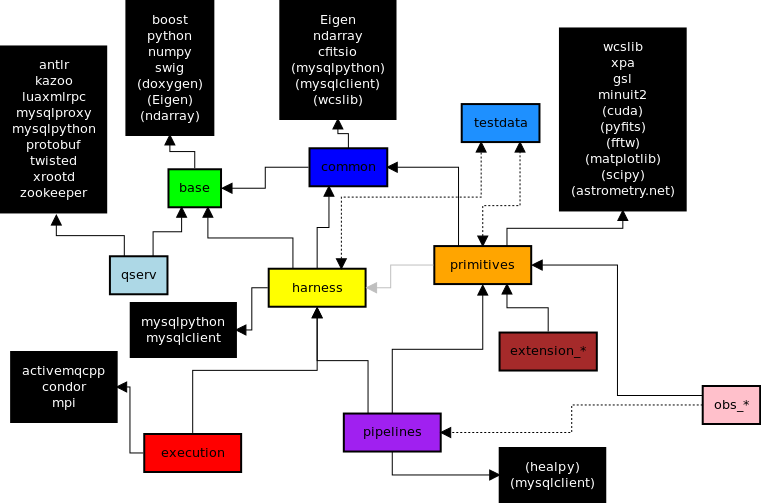





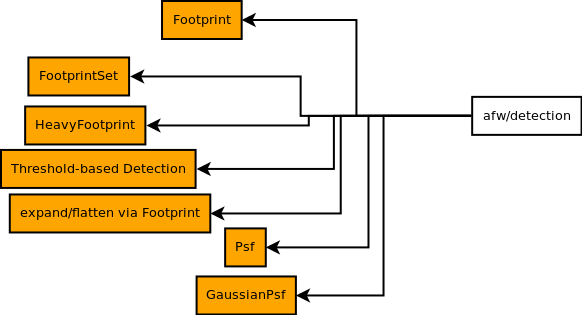

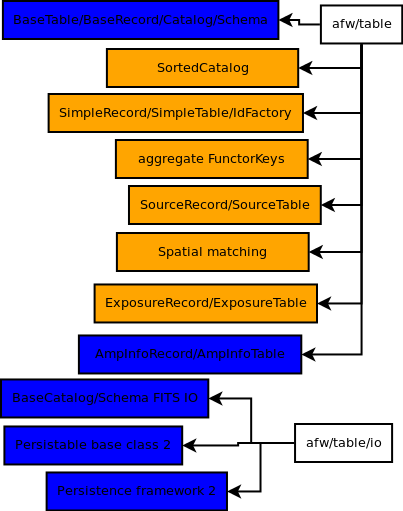

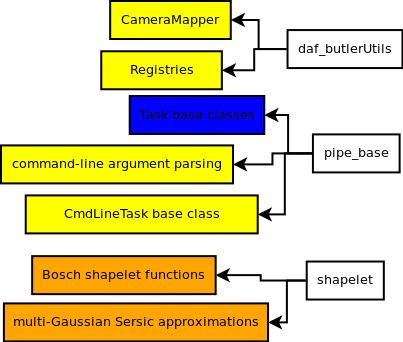
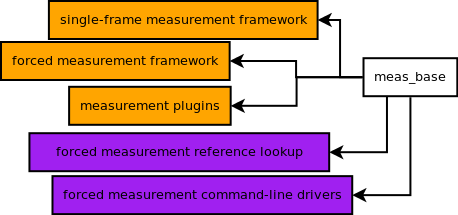
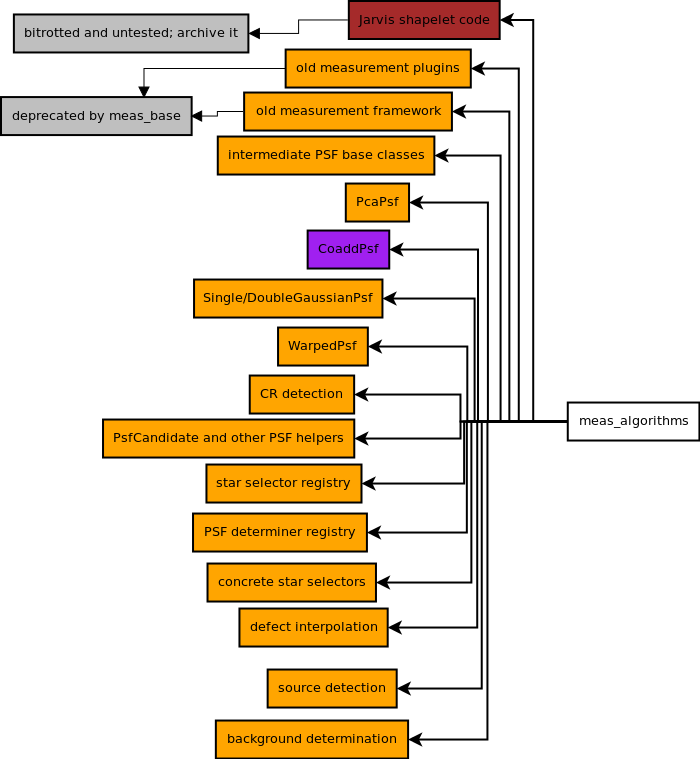





5 Comments
Kian-Tat Lim
I'm a little concerned about the utility of
Taskin a pure, Butler-free environment. Is a little bit ofConfigand a metadataPropertySetsufficient justification for it?Jim Bosch
Well, most of our non-
CmdLineTasksdon't use aButlernow, and many of those that do will continue to in this proposal, as they're coadd-related. I think it's justCalibrateTaskand theIsrTasksthat I'm proposing we change (and on that I'm mostly following Robert's lead).Task also gives us a convenient organization of logging, and more importantly, a standard pattern and set of conventions for callables with state, which most of our high-level algorithm code essentially is. Sure, we could make many
Tasksfree functions, and others functors with no common base class, but this gives them all a consistent look and feel, and I think that makes it easier to learn and use them.Mostly, while I don't want to overstate the utility of
Task, I don't really see that it has a downside.Kian-Tat Lim
I'm currently envisioning (actually even prototyping) the Butler as being able to execute any reader/writer method with the appropriate signature (something like duck-typing). Some of these could be built into classes directly, but they would typically be external (non-intrusive) adapters. The main issue with non-intrusive persistence is getting sufficient access to object internals, either through actual accessors or through delegated (intrusive) persistence methods.
Jim Bosch
Good to hear, and I think that eases some of my fears about having certain objects sit below the Butler in common or base. I'm still a bit worried about the persistable objects we might otherwise want to put in base, though, as it's not just that we'll want to persist those through the
Butler- we may also want to have higher-level C++ classes persist them as part of themselves, and I was planning to put that interface (which is for now my afw::table::io stuff) in common. I think the easiest solution is probably just to move those classes (essentially the more complex geometry objects) to common until that persistence API gets an upgrade.Kian-Tat Lim
Christian Arnault writes:
My responses are: